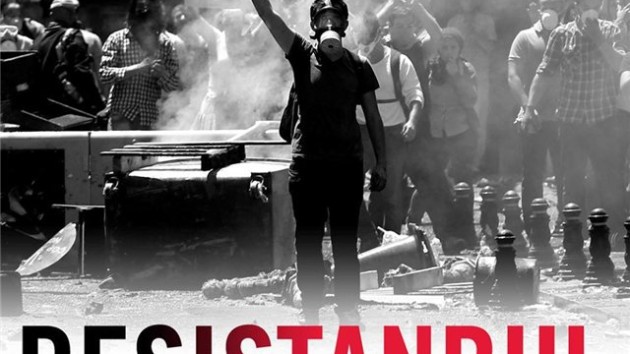Will a Gulenist/Secularist Alliance Topple Erdogan’s Government?
Harold Rhode, former Pentagon Islamic Affairs and expert on Turkey has a provocative Gatestone Institute analysis. Could Premier Recep Tayyip Erdogan fall from power amidst the current corruption controversy in Turkey, “Are Erdogan’s Days Numbered”?
We published an interview with Dr. Rhode in the December NER concerning his role as the Savior of the Iraqi Jewish archives in May of 2003 during Operation Enduring Freedom. An exhibit of selected items from the restored and digitized Iraqi Jewish Archives is currently on exhibit at the Lawrence F. O’Brien gallery of the National Archives and Records Agency in Washington until January 5, 2014.
As we posted in the Iconoclast, the current turmoil in Turkey arises from a split between two former Islamist allies, Erdogan, co-founder of the ruling AKP Party, and Sheikh Mohammad Fethullah Gulen, a reclusive Islamist cult leader and ex-patriate resident in Eastern Pennsylvania who fled arrest in Turkey in 1999. Gulenists control the national and local police and judiciary. Following the 2007 parliamentary sweep by the AKP in their second term, Gulenist prosecutors had tried and convicted former secular Turkish military officers and political opponents charged with conspiracy to overthrow the Islamist AKP.
The current turmoil in Turkey has witnessed the resignation of three AKP ministers, more than 52 arrests including two sons of these Ministers on charges bribery, and payoffs. Among those arrested was the head of the Turkish state-owned Halkbank engaged in illicit gold trading with Iran and others. On Wednesday, Erdogan fresh from a brief trip to Pakistan reshuffled his cabinet and made 10 new appointments. The departing Environment Minister Bayraktar called upon Erdogan to resign implying that others close to the Premier had also been involved with some of the corruption. Erdogan Thursday sacked the prosecutor, who was in the midst of completing second corruption investigation that allegedly might have reached into the core of the Erdogan regime. This touched off a further drop in the Turkish Lira in trading against major currencies.
The co-founder of the AKP party with Erdogan is current Turkish President Abdullah Gul, a Gulenist. The Turkish Presidency is a largely ceremonial post. Erdogan had been seeking a national referendum to transform the Presidency into an n executive post with significant authorities. One Turkish commentator suggested in a Hurriyet Daily Newscolumn, that perhaps Gul might benefit by replacing Erdogan as Premier. In the meantime there is real question of who the AKP would nominate for the March 30, 2014 municipal elections.
Rhode’s analysis suggests that Erdogan’s tenure may not be long. Here are some engrossing excerpts:
Long-brewing political struggles within the ruling AKP have also surfaced. They boil down to two radically different views of Islam. In the first, Erdogan’s faction identifies and allies itself with the [Arab] Muslim Brotherhood. This faction was strongly supportive of the ousted Egyptian Muslim Brotherhood President Muhammad Morsi, and also of Syria’s fundamentalists. In the second view, supporters of Fethullah Gülen look down upon Arab Islam. To them, real Islam is the Islam of the Turks – meaning the people who live in Turkey, Central Asia, and Western China.
Since Erdo?an and his fellow Islamic fundamentalists took power in 2002, Gülen and his forces have been in the background, building prep-schools and propagating their version of Islam — in Turkey, in the Turkic world, and also in America.
[…]
Earlier this year, the enmity between Erdo?an and Gülen broke out into the open, evidently ignited by Turkey’s Geri Park protests — weeks of riots and demonstrations against the Turkish prime minister. Erdo?an encountered enormous difficulty putting them down; in so doing, he alienated large sections of Turkey’s population. Gulenists, active in this uprising, possibly discerning political weakness, may well have used that crisis as an opportunity to try to defeat their opponents.
Perhaps in revenge, Erdo?an . . . proposed laws to ban dershane [prep-schools], the bread and butter of the Gülen movement, and where Gülen recruits followers. [They] later become the political and financial backbone of his movement.] For the Gulenists, Erdogan’s proposed ban appears to have been the decisive provocation.
[…]
Gulen’s supporters responded to this proposed ban by arresting 52 members of Erdogan’s closest associates, including sons of two of his cabinet ministers, and charging them with corruption. According to rumors circulating in Turkey, some of Erdogan’s relatives are also involved in the plot; the facts are still unclear. The central figure in this corruption scandal is an Iranian Azeri, Reza Zarrab — married to a popular Turkish singer — who was illegally trading with Iran. Zarrab is charged with bribing the sons of the Turkish ministers — some of Erdogan’s closest associates.
[…]
Further, the judiciary released from jail the retired General Çevik Bir, who had been strong advocate of U.S.-Turkish-NATO relations. …Bir was … one of the major architects of the Turkish-Israeli rapprochement in the 1990s, and a strong opponent of Fethullah Gülen, whom he apparently saw as an Islamic fundamentalist and a long-term danger to Turkey’s secular and democratic Atatürkist Republic. Because of Bir’s outspoken animosity against the Islamists, which included the powerful Gulen, Bir seems to have been an important factor in Gulen’s decision to flee the country.
So why was Bir — an opponent of Gulen — released by a heavily Gulenist judiciary? Although the reason behind Bir’s release are not yet clear , as an opponent of the Erdogan government …he could now be an ally of Gülen.
Where Turkey’s once highly influential military stands is unclear. So far, it has been silent. It has historically been — and its senior officers still are — steeped in the Atatürkist secular and pro-Western tradition. At least for the moment, the Islamist Gulenists seem to have forged an alliance of convenience with Turkey’s secularists. The beneficiaries of this political upheaval could well be the West, the U.S., NATO, and Israel. Stay tuned.
EDITORS NOTE: This column originally appeared on The New English Review.



